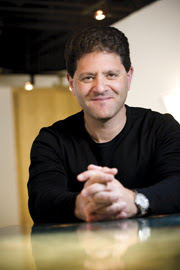The Republican talking-point that says taxing the rich is a
class warfare attack on “job creators” now faces a counterattack from those who
believe the wealthy and their corporations receive far too much credit for the
creation of new jobs.
class warfare attack on “job creators” now faces a counterattack from those who
believe the wealthy and their corporations receive far too much credit for the
creation of new jobs.
And one of those leading critics is a billionaire venture
capitalist, much like Mitt Romney was (except richer).
capitalist, much like Mitt Romney was (except richer).
First, a little bit of math to demonstrate how politicized
and partisan our discussions about economics have become.
and partisan our discussions about economics have become.
If the top 1 percent of income earners, or even the top 10
percent, receive a tax cut, that will not benefit the economy as much as
disbursing that huge tax cut across the broad middle class. The reason? Those in
the category of super-rich, who have incomes that are 1,000 times that of a
worker with a modest paycheck, own three cars, not 3,000 cars. More money
flowing into the pockets of the rich doesn’t jolt the marketplace, but money
flowing to millions of middle class households may encourage many of them to
buy a third car.
percent, receive a tax cut, that will not benefit the economy as much as
disbursing that huge tax cut across the broad middle class. The reason? Those in
the category of super-rich, who have incomes that are 1,000 times that of a
worker with a modest paycheck, own three cars, not 3,000 cars. More money
flowing into the pockets of the rich doesn’t jolt the marketplace, but money
flowing to millions of middle class households may encourage many of them to
buy a third car.
Next, cash for corporations doesn’t necessarily translate
into new jobs for unemployed workers. If each worker at a factory produces 50
units of a product per day, that company – regardless of its tax rate – will make
expansion decisions based on consumer demand. A plan to hire 100 workers makes
little sense unless the company can confidently sell the extra 5,000 units per
day that those additional employees will produce.
into new jobs for unemployed workers. If each worker at a factory produces 50
units of a product per day, that company – regardless of its tax rate – will make
expansion decisions based on consumer demand. A plan to hire 100 workers makes
little sense unless the company can confidently sell the extra 5,000 units per
day that those additional employees will produce.
I would also add this: I doubt there’s an employer in this
country who would rather reap a 10 percent tax cut rather than a 10 percent
increase in sales.
country who would rather reap a 10 percent tax cut rather than a 10 percent
increase in sales.
The job creators tag was created by Frank Luntz, the GOP’s
messaging guru who devises clever phrases and then advises that Republican
officials and activists use those words over and over again.
messaging guru who devises clever phrases and then advises that Republican
officials and activists use those words over and over again.
In a recent opinion piece in The New York Times, author William
Deresiewicz posed the question: Why shouldn’t average, middle class workers be
called the “wealth creators?” After all, it’s the tension between capital and
labor that creates jobs and profits and rising incomes.
Deresiewicz posed the question: Why shouldn’t average, middle class workers be
called the “wealth creators?” After all, it’s the tension between capital and
labor that creates jobs and profits and rising incomes.
Here’s a bit of what Deresiewicz wrote:
“First of all if entrepreneurs are job creators, workers are
wealth creators. Entrepreneurs use wealth to create jobs for workers. Workers
use labor to create wealth (meaning profits) for entrepreneurs. … It’s neither
party’s goal to benefit the other, but that’s what happens nonetheless.”
wealth creators. Entrepreneurs use wealth to create jobs for workers. Workers
use labor to create wealth (meaning profits) for entrepreneurs. … It’s neither
party’s goal to benefit the other, but that’s what happens nonetheless.”
 |
| (Hanauer) |
Another commentator who is determined to destroy the myth of
corporate execs serving as benevolent job creators is Nick Hanauer, one of the founding
investors in Amazon. In a TV interview and a recent speech, the wealthy venture
capitalist has hammered home the message that businesses create jobs when
consumer demand drives up sales.
corporate execs serving as benevolent job creators is Nick Hanauer, one of the founding
investors in Amazon. In a TV interview and a recent speech, the wealthy venture
capitalist has hammered home the message that businesses create jobs when
consumer demand drives up sales.
Contrary to the Luntz-created propaganda, Hanauer pointed
out that businesses traditionally try to avoid making new hires. Increasing
employment is “a course of last resort,” Hanauer said.
out that businesses traditionally try to avoid making new hires. Increasing
employment is “a course of last resort,” Hanauer said.
Each additional worker adds to a company’s cost per unit
which, of course, eats into their profits. So to say that the wealthy who run
our corporations are job creators is “somewhat disingenuous,” he said.
which, of course, eats into their profits. So to say that the wealthy who run
our corporations are job creators is “somewhat disingenuous,” he said.
After all, the economy would be growing far faster if middle
class incomes had risen as much as the steep gains enjoyed by the top 1 percent
over the past three decades.
class incomes had risen as much as the steep gains enjoyed by the top 1 percent
over the past three decades.
And if profitable corporations are the key to enjoying more jobs, why is that corporate profits are at a 50-year high at the same time that participation in the workforce is at a 50-year low?
In summary, Hanauer said, “trickle down orthodoxy is a
complete and bogus lie.”
complete and bogus lie.”
You can watch a short video of Hanauer addressing these subjects here.







